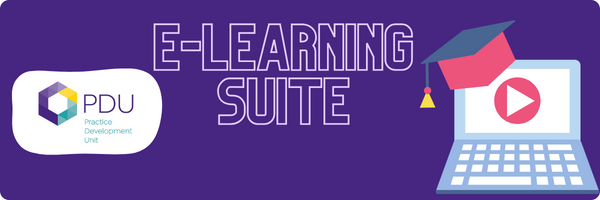
The PDU hosts a comprehensive e-learning suite, covering themes relating to:
- Multiple Disadvantage
- Trauma Informed Care (TIC)
- Psychologically Informed Environments (PIE), and
- Acceptance and Commitment Therapy (ACT).
This e-learning was developed in collaboration with specialist staff and clinical psychologists in local organisations and received inputs from people with lived experience of severe and multiple disadvantage (SMD).
Each module takes approximately 45 minutes to complete. These can be accessed at any time and allow learners to study at their own pace.
Cost: There is currently no charge to access the PDU e-learning suite.
How to access: Use the links below to access each of our e-learning modules.
Certificate of completion:
After you have completed an e-learning module, you will be asked to submit a feedback form. This will provide you with a link to download a certificate of completion, to act as a record of your learning.
Modules
Understanding Multiple Disadvantage
We have an introductory module aimed at professionals and volunteers from all sectors who work with people who may be facing multiple sources of disadvantage. This module covers: what is multiple disadvantage and what it feels to face it; the underlying causes of complex needs; how services are failing service users who have multiple needs; why system change is important.
We also have two follow up modules for people who are looking to develop gender and culturally responsive approaches in their working practice and better understand the importance of this.
Read our Introduction to Multiple Disadvantage Leaflet
Psychologically Informed Environments (PIE)
Psychologically informed environments (PIE) are services that are designed and delivered in a way that takes into account the emotional and psychological needs of the individuals using them and working in them.
People who experience SMD are often vulnerable and socially excluded. Many have experienced adversity or trauma, and as a result may have complex psychological and emotional needs. This can lead to difficulties interacting with people and engaging with services. It’s important that we recognise and address this when working with clients.
The PDU has eight e-learning modules to help our members to better understand the principles of Psychologically Informed Environments (PIE) and how to adopt these within their roles/organisations:
- Introduction to Psychologically Informed Environments (PIE)
- Using Psychological Theories in Your Working Relationships
- Coping with Incidents at work
- Post Incident Peer Support
- Spaces of Opportunity
- Relationships and Rules
- Readiness for Change
- Learning, enquiry and reflective practice
Trauma Informed Care (TIC)
Approximately 85% of people facing severe and multiple disadvantage (SMD) have experienced adverse childhood experiences and childhood trauma.
Working in trauma informed ways helps us to improve the accessibility and quality of services by creating culturally sensitive, safe services that people trust and want to use.
Trauma-informed care shifts the focus from “What’s wrong with you?” to “What happened to you?”
The PDU has five e-learning modules on this topic:
- Introduction to Trauma Informed Care
- Introduction to the Impact of Trauma on Body and Brain
- Brain injury and multiple disadvantage
- Recovery from Trauma
- How to maintain wellbeing when working with people with histories of trauma
Acceptance and Commitment Therapy (ACT)
Acceptance and Commitment Therapy (ACT) is a type of talking therapy, which helps people learn to manage emotions and not block them out. It tries to improve what is called ‘psychological flexibility’ – the ability to be open to difficult emotions, aware of your own behaviour, and do things that are important to you. ACT has shown to be effective for frontline staff to support with a range of difficulties people may face, including stress, burnout, anxiety, and depression.
ACT has a good evidence base for improving the wellbeing of people who find themselves facing a wide range of challenging situations, including mental health difficulties, trauma, chronic health conditions, work-place stress, homelessness, and substance misuse.
The PDU has four e-learning modules to help our members learn about the key principles of ACT:
- ACT on Wellbeing- Introduction to Acceptance Commitment Therapy (ACT)- Module 1
- ACT on Wellbeing- Module 2 “Being Open”
- ACT on Wellbeing- Module 3 “Being Aware”
- ACT on Wellbeing- Module 4 “Being Active”